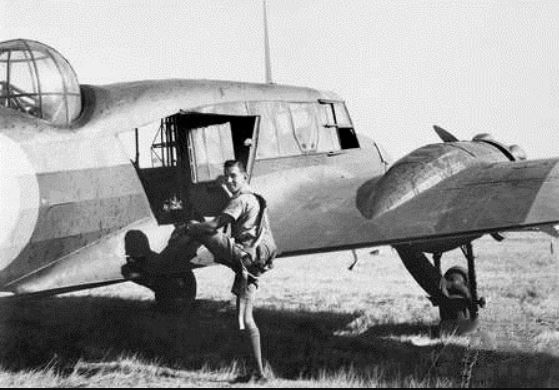Difference between revisions of "No. 4 Service Flying Training School RAAF"
From Our Contribution
(→Unit personnel) |
(→Trainees) |
||
| Line 34: | Line 34: | ||
===Trainees=== | ===Trainees=== | ||
*[[Clifford Stanley Douglas]] 10 Mar - 26 Jun 1941 | *[[Clifford Stanley Douglas]] 10 Mar - 26 Jun 1941 | ||
| − | *[[Roy Joseph Smith]] 2 Jun 1941 - 19 Sep 1941 - Course | + | * [[Gerard Henzell Straughan Hemy]] May - Jun 1941 RAAF Air Navigation School |
| + | * [[† Frank Keith Morcombe DFC]] 2 Jun 1941 - 21 Sep 1941 - Pilot No 11 Course | ||
| + | *[[Roy Joseph Smith]] 2 Jun 1941 - 19 Sep 1941 - Pilot No 11 Course | ||
*[[William James (Jim) Morcombe]] 9 Feb - 28 May 1942 | *[[William James (Jim) Morcombe]] 9 Feb - 28 May 1942 | ||
Revision as of 14:06, 29 December 2020
 A trainee pilot boarding his Anson at Geraldton | |
Brief History
No. 4 Service Plying Training School (4SFTS) was formed at the 6 Mile Aerodrome, Geraldton in February 1941 as part of the Empire Air Training Scheme. The function of the School was to provide intermediate and advanced flying training for RAAF personnel who had completed their elementary flying training at both Perth and Cunderdin. The base at Geraldton was still under construction when flying commenced at the School on 10 March 1941. Aside from the lack of ground facilities, problems were encountered with the serviceability of aircraft as all of the Anson aircraft came from other units, who had disposed of their oldest air frames. As a result only limiting flying training occurred in the early days of the School. In November 1941, eight of its Ansons took part in the search for survivors from HMAS Sydney.
Every 28 days an intake of 60 or so pupils arrived at the School from Cunderdin, spending approximately four months at the School before 50 or so would graduate. The course was broken into an intermediate and an advanced course, each of eight weeks duration. As with most Service Flying Training Schools, a primary concern was the accident rate, which caused a loss of flying hours, aircraft and, at times, airmen. This School existed for 22 months before a flying fatality occurred, but eventually eight airmen perished and four more were injured in flying accidents.
With the Japanese entry into the War, and their attacks on north-western Australia, Reserve squadrons were formed in all twin engine training units, including 4SFTS (Nos. 68 and 69 Reserve Squadrons) as a precautionary measure. Apart from occasional searches to sea, they were never called for active duty. Flying training continued throughout 1943, although by the end of the year the number of operational sorties was minimal. Throughout 1944 flying was further reduced and from January 1945, the total disbandment of the unit was commenced, and was completed in May 1945. With over 1,000 trainees successfully passing through the School, and an enviable flying safety record, 4SFTS had fulfilled its role.
Unit personnel
- Millie Elizabeth Treloar
- Harry Beard 22 Sep 1940 - 15 Jan 1945
- Robert Alexander MacLean 18 Dec 1940 - 28 Jul 1941
- Edward Trayton Elvish 2 Mar 1941 - 4 Jan 1942
- Oswald Francis Williams 11 Mar 1941 - 5 Dec 1941
- Reginald Thomas Blackman 14 Mar 1941 - 19 May 1942
- James Winning Cunningham 14 Dec 1943 - 13 Jun 1944
- Laurence Harold Smith 31 May - 27 Jun 1945
Trainees
- Clifford Stanley Douglas 10 Mar - 26 Jun 1941
- Gerard Henzell Straughan Hemy May - Jun 1941 RAAF Air Navigation School
- † Frank Keith Morcombe DFC 2 Jun 1941 - 21 Sep 1941 - Pilot No 11 Course
- Roy Joseph Smith 2 Jun 1941 - 19 Sep 1941 - Pilot No 11 Course
- William James (Jim) Morcombe 9 Feb - 28 May 1942
Notes
Content has come from Units of the Royal Australian Air Force - A Concise History - Volume 8 Training Units - Australian Government Publishing Service, 1995.